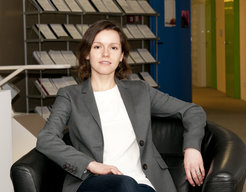Toxic or not? How Children Learn About Plants
New research group at the Max Planck Institute for Human Development
A new Max Planck Research Group led by psychologist Annie Wertz examines social learning strategies in dealing with plants.

Since January 2015, Annie Wertz is the head of the new research group „Naturalistic Social Cognition: Developmental and Evolutionary Perspectives“ at the Max Planck Institute for Human Development. She studied psychology at Boston University and completed her PhD at the University of California, Santa Barbara in 2009. Her research focuses on the way human beings obtained information about plants in the course of evolution. Knowing which plants are edible and which are poisonous has always been critical to human survival. In previous research at Yale University, Dr. Wertz was able to show that 6- to 18-month-old infants learn about plants by watching other individuals – such as more knowledgeable adults – deal with plants. She received the Postdoctoral Award of the Human Behavior and Evolution Society 2012 for this work.
She will now continue and extend her research on this topic at the Max Planck Institute for Human Development. “There are still many open questions because this is a new research field,“ says Annie Wertz. Employing a combination of laboratory studies and observations of parent–child interactions, for example, she would like to examine whether there are cross-cultural differences in dealing with plants or how social learning strategies change across the lifespan. She also aims to find out to what degree the findings are transferable, for instance, to animals or other knowledge domains. In this way, she hopes to obtain fundamental insights into the interplay of evolutionary predispositions and individual development that allow human beings to accumulate cultural knowledge. For this purpose, she integrates theories and methods of cognitive science, developmental psychology, evolutionary theory, and biological anthropology.
“Annie Wertz brings a fascinating and innovative research topic to our institute,” says Ralph Hertwig, Managing Director of the Max Planck Institute for Human Development. “How do children react to plants? How do they decide whether to touch them or even to put them in their mouth? These are wonderful examples for the ways in which children learn how to deal with uncertainty and risk and to make decisions in early infancy.“
By awarding leadership positions for Max Planck Research Groups the Max Planck Society supports the careers of junior scientists. The Research Groups have their own personnel and material budgets and use the infra-structure and administration of the respective host institute. This allows them to work on their own research projects independently.
About Annie E. Wertz
Annie Wertz studied psychology at Boston University until 2003. In 2009, she completed her PhD in developmental and evolutionary psychology at the University of California, Santa Barbara. From 2009 to 2014 she was a research scientist at Yale University where she worked on selective social learning strategies in infancy. In 2012 she received the Postdoctoral Award of the Human Behavior and Evolution Society. Since January 2015 she is the head of the Max Planck Research Group “Naturalistic Social Cognition: Developmental and Evolutionary Perspectives” at the Max-Planck Institute for Human Development.












